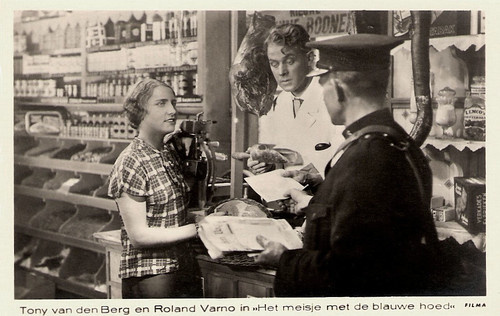
Dutch postcard by M. B.& Z. (M. Bonnist & Zonen, Amsterdam). Photo: Filma.Publicity still for Het Meisje met de Blauwe Hoed/The girl with the blue hat (Rudolf Meinert, 1934) with Tony van den Berg and Roland Varno.
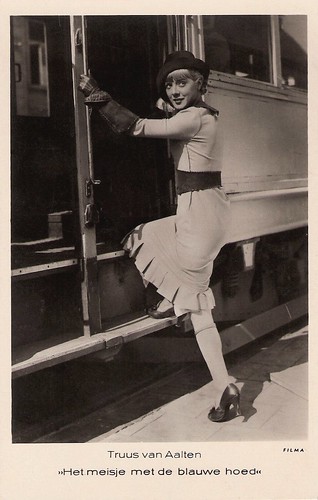
Dutch postcard by M. B.& Z. (M. Bonnist & Zonen, Amsterdam). Photo: Filma. Publicity still for Het meisje met den blauwen hoed/ The Girl with the Blue Hat (Rudolf Meinert, 1934) with Truus van Aalten. Collection: Egbert Barten. Comment by Ali Gardener at Flickr: "It looks like taken very spontaneous and still so perfectly posed! I like also the shadow of the shoes and all those splendid details."
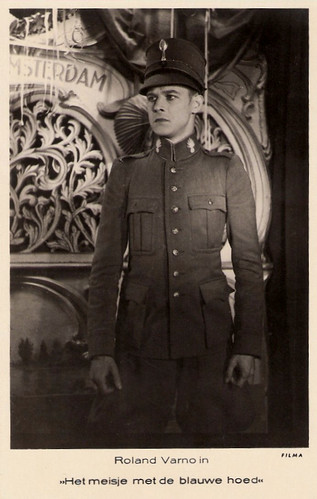
Dutch postcard by M. B.& Z. (M. Bonnist & Zonen, Amsterdam). Photo: Filma. Publicity still for Het meisje met de blauwe hoed/The Girl With the Blue Hat (Rudolf Meinert, 1934) with Roland Varno. Collectie: Egbert Barten.
Unusual for the Netherlands
Het meisje met de blauwe hoed/The girl with the blue hat was an unusual production for the Netherlands in the 1930s. It was the first production by Filma, the film production company of 27 years old Wil Tuschinski, son of cinema chain owner Abraham Tuschinski. For the first time, a moving camera was used in the Cinetone Sound Film studios in Amsterdam. The production costs amounted to 100,000 guilders - a record for the Dutch film industry at the time.
The three stars were also interesting. Dutch-born actor Roland Varno (1908-1996) is best known for his role as one of the schoolboys in Josef von Sternberg's Der blaue Engel/The blue angel (1930). He appeared in several German and Dutch films of the early 1930s and then moved to Hollywood, where he made a film with Greta Garbo, As You Desire me (George Fitzmaurice, 1932). However, he mostly worked in Hollywood as a character actor, often in B-pictures.
The female leading role was played by another Dutch film star with a career abroad, Truus van Aalten (1910-1999). She starred in 29 European films during the 1920s and 1930s. She made most of them in Berlin and Vienna, and Het Meisje met de Blauwe Hoed/The girl with the blue hat was the only film she made in the Netherlands.
Singer and entertainer Lou Bandy (1890-1959) played a dual role in Het meisje met de blauwe hoed/The girl with the blue hat as Toontje and as himself. Bandy was one of the most popular artists of The Netherlands between the two world wars. His songs Zoek de zon op (Look for the sun) and Louise zit niet op je nagels te bijten (Louise, don't bite your nails) became Dutch evergreens. In this film, Bandy sings the songs In de petoet (In the brig) and Vaste verkering (Steady dating) which soon became hits in the Netherlands.
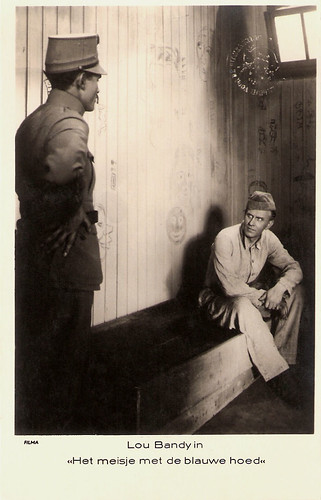
Dutch postcard by M. B. & Z. (M. Bonnist & Zonen, Amsterdam). Photo: Filma. Publicity still for Het Meisje met de Blauwe Hoed/The girl with the blue hat (Rudolf Meinert, 1934) with Lou Bandy.

Dutch postcard by M. B. & Z. (M. Bonnist & Zonen, Amsterdam). Photo: Filma. Publicity still for Het Meisje met de Blauwe Hoed/The girl with the blue hat (Rudolf Meinert, 1934) with Lou Bandy.
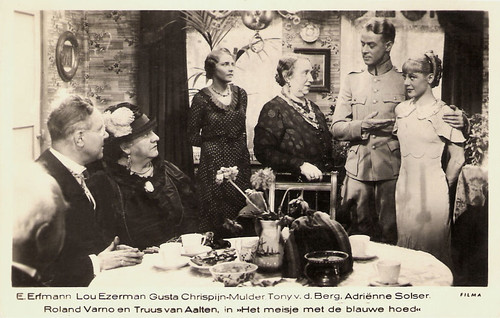
Dutch postcard by M. B. & Z. (M. Bonnist & Zonen, Amsterdam). Photo: Filma. Publicity still for Het Meisje met de Blauwe Hoed/The girl with the blue hat (Rudolf Meinert, 1934) with Eberhard Erfmann, Lau Ezerman, Gusta Chrispijn-Mulder, Tony van den Berg, Adrienne Solser, Roland Varno and Truus van Aalten.
Too wild for him
The film is also described as an army comedy. The story was based on a semi-autobiographical novel which Johan Fabricius published in 1927 and follows the story quite well. Roland Varno plays nerdy Daantje Pieters, who works in a grocery shop in Gouda when he is suddenly called to The Hague to serve for the Dutch army.
In the army, Daantje is the victim of teasing of his fellow soldiers. Especially his roommate Toontje (Lou Bandy) has great pleasure in keeping him fooled. The only thing that keeps Daantje going is the thought of 'the girl with the blue hat' (Truus van Aalten), a beautiful girl he spotted aboard the train to the garrison.
Despite the unfriendly beginning, smart and sneaky conman Toontje takes Daantje under his wing (not to mention his grocery supplies). During a visit to a revue of Lou Bandy Daantje notices again the girl with the blue hat. He is too shy to approach her, but Toontje arranges a meeting in a bar, to the chagrin of her date. The girl, who answers to the name Betsy, is attracted to Daantje and the two spend a romantic evening.
Daantjes mother (Adriënne Solser) is not impressed by the sexually liberated Betsy and sees her son would rather marry his neighbour Hilda Jansma (Tony van den Berg). Back in The Hague Betsy realizes that she and Danny do not fit together. She explains that she is too wild for him and breaks off the engagement.
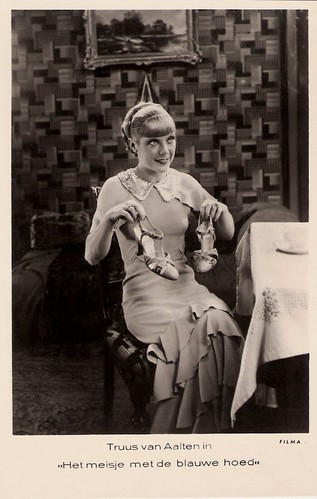
Dutch postcard by M. B.& Z. (M. Bonnist & Zonen, Amsterdam). Photo: Filma. Publicity still for Het Meisje met de Blauwe Hoed/The girl with the blue hat (Rudolf Meinert, 1934) with Truus van Aalten.
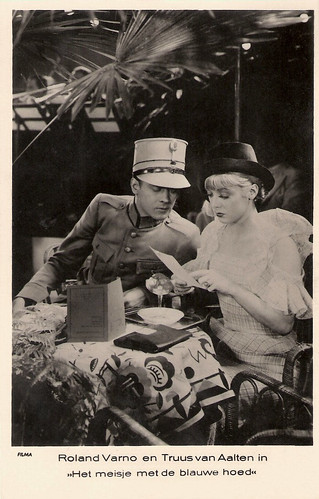
Dutch postcard by M. B.& Z. (M. Bonnist & Zonen, Amsterdam). Photo: Filma. Publicity still for Het Meisje met de Blauwe Hoed/The girl with the blue hat (Rudolf Meinert, 1934) with Roland Varno and Truus van Aalten.
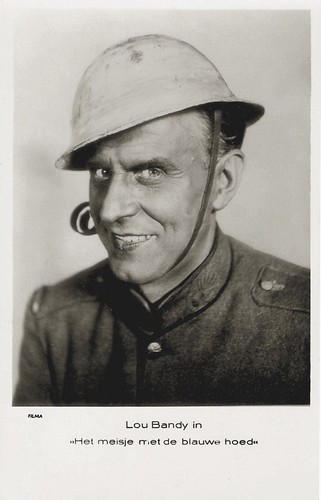
Dutch postcard by M. B. & Z. (M. Bonnist & Zonen, Amsterdam). Photo: Filma. Publicity still for Het Meisje met de Blauwe Hoed/The girl with the blue hat (1934) with Lou Bandy.
War Propaganda
During the Second World War, Het Meisje met de Blauwe Hoed/The girl with the blue hat was banned by the Nazis along with two other Dutch films, De Big van het Regiment/The Regiment's Mascot (Max Nosseck, 1935) and Ergens in Nederland/Somewhere in the Netherlands (Ludwig Berger, 1940) because of 'war propaganda'.
Chip Douglas at IMDb loves the film: "As a piece of Dutch cinema history this film is a clear standout. " About Varno and Van Aalten he notes: "They play their parts well, but it is Bandy who dominates the picture. His contribution, as well as the musical numbers managed to bring in a large enough audience to break even. However, writer Fabricius apparently wasn't very pleased when he found out they turned his book into a musical."
In 1972, a seven-part Dutch television series was broadcast, Het Meisje met de Blauwe Hoed/The girl with the blue hat (Dick van 't Sant, 1972) with Huib Rooymans, Jenny Arean and André van Duin in the lead roles. Rooijmans and Arean were married at the time, but divorced in 1973. Due to its length, the story was reworked and the very popular TV series contained more scenes and even more songs. Fabricius possibly turned in his grave.
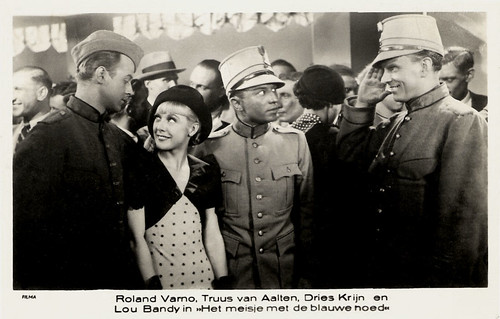
Dutch postcard by M. B.& Z. (M. Bonnist & Zonen, Amsterdam). Photo: Filma. Publicity still for Het Meisje met de Blauwe Hoed (1934) with Roland Varno, Truus van Aalten, Dries Krijn en Lou Bandy.

Dutch postcard by R.E.B., no. 3. Photo: publicity still for Het Meisje met de Blauwe Hoed/The girl with the blue hat (1934) with Lou Bandy and Roland Varno.
Scene from Het Meisje met de Blauwe Hoed/The girl with the blue hat (1934). Source: Kanaal van Johanpa3 (YouTube).
Scene from the TV series with André van Duin singing Vaste verkering. Source: Johnny Keurntjes (YouTube).
Sources: Henk van Gelder (Hollands Hollywood - Dutch), Kathinka Dittrich (Geschiedenis van de Nederlandse Film en Bioscoop tot 1940 - Dutch), Chip Douglas (IMDb), Wikipedia (Dutch) and IMDb.
1 comment:
Very interesting that it was also adapted to a TV series. Obviously, I had never heard of it. I always learn something new here.
Post a Comment